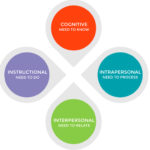Personalized learning is rooted in the belief that all children can learn, should be challenged to take ownership of their learning as individuals and empowered with the academic knowledge and social-emotional skills they need for the future. To support learning that is personalized to each student means the role of teachers and the skillsets they need is evolving.
To address this need, in 2015 the Council of Chief State School Officers (CCSSO) and Jobs for the Future released Educator Competencies for Personalized, Learner-Centered Teaching to outline the unique competencies educators need in order to create and thrive in effective personalized learning environments. These build on and push beyond the best existing teaching competencies and standards to capture what educators need in order to create and thrive in personalized, learner-centered systems.

Since the original release, we know schools, districts, state education agencies and other education organizations have utilized the Educator Competencies to support transformation to a new form of teaching and learning that put students and their learning at the center. The CCSSO and KnowledgeWorks have begun a journey to better understand how the field is using the resources and to better understand how to expand the reach and use of the competencies to support more student-centered approaches to teaching and learning.
Thank you to all for participating in the survey to help us understand the current use of the competencies in the field and recommendations to increase use. We look forward to learning the results and sharing them with you soon.